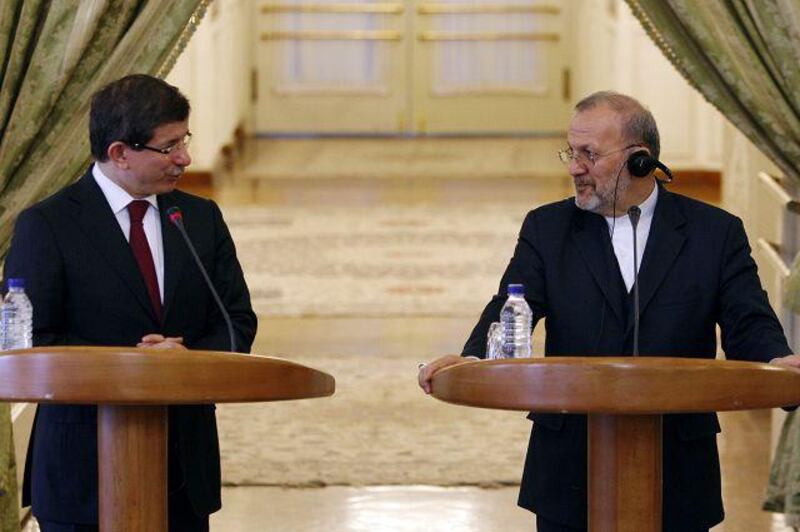ISTANBUL // After months of fruitless attempts to mediate between Iran and the West in the row over Tehran's nuclear programme, Turkey's government says it sees progress in efforts to get both sides talking again. But doubts remain whether the new momentum reported by Ankara will produce results before the United Nations Security Council decides on fresh sanctions against the Islamic republic.
"What is most important is the fact that the Iranian side is very receptive," Ahmet Davutoglu was quoted as saying by Turkish media after a visit to Tehran last week. "I am very hopeful." The foreign minister also said frozen talks between the Iranians and the West could resume, but gave no details as to what change had occurred to make that possible. Mr Davutoglu and his diplomats have been engaged in an intense effort to avoid sanctions against Iran by settling the nuclear row diplomatically. Turkey has also teamed up with Brazil, another non-permanent member of the Security Council that has spoken out against sanctions. After talks with Mr Davutoglu in Istanbul last weekend, Celso Amorim, Brazil's foreign minister, visited Tehran earlier this week. Iran says its nuclear programme is only for civilian use, but the West suspects that Tehran wants to build an atom bomb.
Turkish diplomats say Ankara is aware that pressure is building in the West to introduce new economic sanctions against neighbouring Iran, something Turkey wants to avoid at all cost. "US patience is running out," a senior diplomat said on condition of anonymity. "But we think that there is still time." Ankara says it is ready to have low-enriched Iranian uranium stored in Turkey as part of a deal between Tehran and the international community, represented by the five permanent members of the Security Council, China, France, Russia, the United States and the United Kingdom, as well as Germany. But talks about the uranium exchange deal, first proposed last year, have been deadlocked.
Ever since Mr Davutoglu became foreign minister one year ago, he has stressed Turkey's ambition to become a leading regional power and honest broker in international disputes. It remains unclear, however, whether Turkey has enough influence in Tehran to persuade the Iranians "to meet the worries of the international community", as the Turkish diplomat put it. The Iranian government has said it is thankful for Turkey's efforts, but has not embraced Ankara as a mediator in the nuclear row. Turkish diplomats say it is not easy to fathom Tehran's real position because of competing power centres in Iranian politics.
Despite those difficulties and a lack of progress in the row over the Iranian nuclear programme, Mr Davutoglu sounded upbeat when asked about his latest efforts, which included talks in Washington, Tehran and Brussels. "There are concrete proposals on the table," he told the English-language newspaper Today's Zaman after his talks in Tehran. But he did not say which proposals were being discussed, and some think Mr Davutoglu's efforts may turn out to have been in vain.
"It is clear that if he can pull it off and ease the international tension over Iran, then both his and Turkey's international prestige will increase greatly," Semih Idiz, a foreign policy commentator, wrote about Mr Davutoglu in another English-language daily, the Hurriyet Daily News. "But if he cannot, then Turkey will not just have been isolated in Nato and Europe, but will also end up having been used by Iran to buy time against the West."
Ankara's initiative is partly driven by a strong interest to avoid a decision about sanctions in the UN security council. "We haven't seen the text" of a possible sanctions resolution that may be tabled in the council in the coming weeks, the Turkish diplomat said. "Would it include [sanctions concerning] oil? Would it concern banking? We don't know." Turkey has been accused in the West of taking Tehran's side in the nuclear issue, but Ankara says its attempts to avoid sanctions are rooted in self-interest. Turkey is concerned that it would be hit by sanctions against Tehran, an important supplier of natural gas for Turkey.
There has also been progress in increasing co-operation between Turkey and Iran along their joint border of 450km. During a meeting last week, police officials from both sides agreed to step up joint efforts against drug smuggling, human trafficking and activities of Kurdish rebels operating from mountain hideouts in northern Iraq, Turkish media reported. Joint Turkish-Iranian police actions in the border area would be possible in future, the reports said.
Ankara also has important economic interests in Iran's energy industry, which could be hit by new sanctions. Turkish Petroleum Corp, or TPAO, Turkey's national oil company, is to invest around $3.5 billion (Dh11.02bn) to develop parts of Iran's South Pars natural gasfield. "Neighbouring countries, and especially Turkey, will pay the price" for tensions between the West and Iran, Mr Davutoglu said in Brussels last week. "If there is a country that has to get involved in this issue, it is Turkey."
tseibert@thenational.ae





